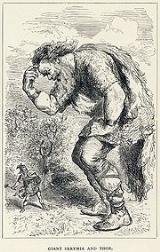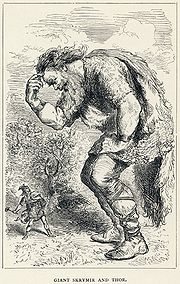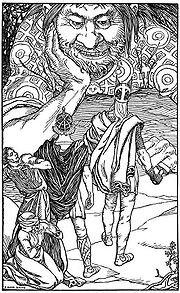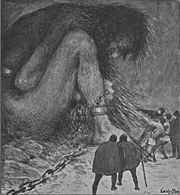
Útgarða-Loki
Encyclopedia


Norse mythology
Norse mythology, a subset of Germanic mythology, is the overall term for the myths, legends and beliefs about supernatural beings of Norse pagans. It flourished prior to the Christianization of Scandinavia, during the Early Middle Ages, and passed into Nordic folklore, with some aspects surviving...
, Útgarða-Loki (Anglicized as Utgarda-Loki and in other ways) was the ruler of the castle Útgarðr in Jötunheimr
Jötunheimr
Jötunheimr is one of the Nine Worlds and the homeland of the Giants of Norse Mythology — Rock Giants and Frost Giants.-Legend:...
. He was one of the Jötnar and his name means literally "Loki of the Outyards," to distinguish him from Loki
Loki
In Norse mythology, Loki or Loke is a god or jötunn . Loki is the son of Fárbauti and Laufey, and the brother of Helblindi and Býleistr. By the jötunn Angrboða, Loki is the father of Hel, the wolf Fenrir, and the world serpent Jörmungandr. By his wife Sigyn, Loki is the father of Nari or Narfi...
, the companion of Thor
Thor
In Norse mythology, Thor is a hammer-wielding god associated with thunder, lightning, storms, oak trees, strength, the protection of mankind, and also hallowing, healing, and fertility...
.
Prose Edda
According to the Prose EddaProse Edda
The Prose Edda, also known as the Younger Edda, Snorri's Edda or simply Edda, is an Icelandic collection of four sections interspersed with excerpts from earlier skaldic and Eddic poetry containing tales from Nordic mythology...
book Gylfaginning
Gylfaginning
Gylfaginning, or the Tricking of Gylfi , is the first part of Snorri Sturluson's Prose Edda after Prologue. The Gylfaginning deals with the creation and destruction of the world of the Norse gods, and many other aspects of Norse mythology...
, Thor
Thor
In Norse mythology, Thor is a hammer-wielding god associated with thunder, lightning, storms, oak trees, strength, the protection of mankind, and also hallowing, healing, and fertility...
, Þjálfi and Loki
Loki
In Norse mythology, Loki or Loke is a god or jötunn . Loki is the son of Fárbauti and Laufey, and the brother of Helblindi and Býleistr. By the jötunn Angrboða, Loki is the father of Hel, the wolf Fenrir, and the world serpent Jörmungandr. By his wife Sigyn, Loki is the father of Nari or Narfi...
, during their travel to Útgarðr, unwittingly settle for the night and sleep in the glove of a giant named Skrýmir ("Big-looking"), an incident for which Thor is ridiculed in several poems of the Poetic Edda
Poetic Edda
The Poetic Edda is a collection of Old Norse poems primarily preserved in the Icelandic mediaeval manuscript Codex Regius. Along with Snorri Sturluson's Prose Edda, the Poetic Edda is the most important extant source on Norse mythology and Germanic heroic legends, and from the early 19th century...
. The giant accompanies them on their travel and tricks their food from them. Starved and in rage, Thor tries to kill Skrýmir while the giant sleeps, but fails because the giant magically shields himself behind a mountain.
Once Thor and his fellows arrive at the castle of Útgarða-Loki, so tall that they must bend back their necks to see its roof, Útgarða-Loki challenges them with several contests, all based on magical delusions. Loki participates in an eating contest against fire personified. Þjálfi competes in running against the mind of Útgarða-Loki. Thor first tries to empty a drinking horn
Drinking horn
A drinking horn is the horn of a bovid used as a drinking vessel. Drinking horns are known from Classical Antiquity especially in Thrace and the Balkans, and remained in use for ceremonial purposes throughout the Middle Ages and the Early Modern period in some parts of Europe, notably in Germanic...
connected to the sea, then tries to lift the midgard serpent in the appearance of a cat, and finally, in rage, wrestles with Elli
Elli
In Norse mythology, Elli is a personification of old age who, in the Prose Edda book Gylfaginning, defeats Thor in a wrestling match.-Gylfaginning:...
, Old Age personified.
Despite their failures in the contests, Útgarða-Loki now treats them respectfully. As they leave the castle the next morning, Útgarða-Loki says:
nú skal segja þér hit sanna, er þú ert út kominn or borginni, at ef ek lifi ok megak ráða, þá skaltu aldri optarr í hana koma; ok þát veit trúa mín, at aldri hefðir þú í hana komit, ef ek hefða vitat áðr, at þú hefðir svá mikinn krapt með þér, ok þú hafðir svá nær haft oss mikilli ófœru. Enn sjónhverfingar hefi ek gert þér, svá at fyrsta sinn, er ek fann þik á skóginum, kom ek til fundar við yðr; ok þá er þú skyldir leysa nestbaggann, þá hafðak bundit med gresjárni, enn þú fannt eigi, hvar upp skyldi lúka. [...] Enn er þú drakkt af horninu, ok þótti þér seint liða; en þát veit trúa min, at þá varð þat unðr, er ek munda eigi trúa at vera mætti; annarr endir hornsins var út i hafi, enn þat sáttú eigi; enn nú, er þú kemr til sjávarins, þá muntú sjá mega, hvern þurð þú hefir drukkit á sænum; þat eru nú fjörur kallaðar. |
"I shall tell you the truth, now you are out of my castle, and if I live and have a say, you shall never enter it again, and I would indeed never have let you in if I had known your strength beforehand, and you were very close to bringing us a great disaster. You see, I cast delusions on you, so that it was I who met you at first in the forest; and when you tried to untie the food bag, I had tied it with a magic wire, and you did not find out how to untie it. [...] And when you drank from the horn and thought it slow to sink, I dare say that was a miracle I had not expected to be possible; the far end of the horn was submerged in the sea, but you did not see that. Now, when you come to the shore, you will see what kind of sip you drank from the sea; there is now a sandy beach where there used to be water." |
On hearing this, Thor grabs his hammer and prepares to strike, when Útgarða-Loki and his castle magically disappear, leaving only a beautiful prairie.
Gesta Danorum

Gesta Danorum
Gesta Danorum is a patriotic work of Danish history, by the 12th century author Saxo Grammaticus . It is the most ambitious literary undertaking of medieval Denmark and is an essential source for the nation's early history...
a ship meets strong winds and sacrifices are made to various gods to obtain favorable weather, including to one called Utgarthilocus. With vows and propitiations to him a beneficial spell of weather is obtained. Later an expedition to the land of the giants comes upon this figure.
Ex qua item atrum obscenumque conclave visentibus aperitur. Intra quod Utgarthilocus manus pedesque immensis catenarum molibus oneratus aspicitur, cuius olentes pili tam magnitudine quam rigore corneas aequaverant hastas. Quorum unum Thorkillus, adnitentibus sociis, mento patientis excussum, quo promptior fides suis haberetur operibus, asservavit; statimque tanta foetoris vis ad circumstantes manavit, ut nisi repressis amiculo naribus respirare nequirent. |
From here the visitors could see a murky, repulsive chamber, inside which they descried Utgartha-Loki, his hands and feet laden with a huge weight of fetters. His rank-smelling hairs were as long and tough as spears of cornel-wood. Thorkil kept one of these as a more visible proof of his labours by heaving at it with his friends till it was plucked from the chin of the unresisting figure; immediately such a powerful stench rolled over the bystanders that they had to smother their nostrils in their cloaks and could scarcely breathe. |
As a proof of their accomplishments, the men bring back a hair pulled from the giant's beard, stinking so harshly that several men drop dead on smelling it.
Apart from the name of the giant there is little that reminds of Snorri's Útgarða-Loki. The bound giant figure is more reminiscent of the bound Loki
Loki
In Norse mythology, Loki or Loke is a god or jötunn . Loki is the son of Fárbauti and Laufey, and the brother of Helblindi and Býleistr. By the jötunn Angrboða, Loki is the father of Hel, the wolf Fenrir, and the world serpent Jörmungandr. By his wife Sigyn, Loki is the father of Nari or Narfi...
who likewise lies chained and tortured in a cave.

